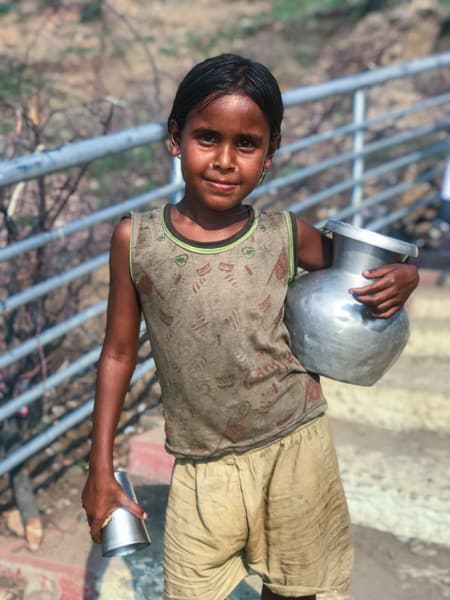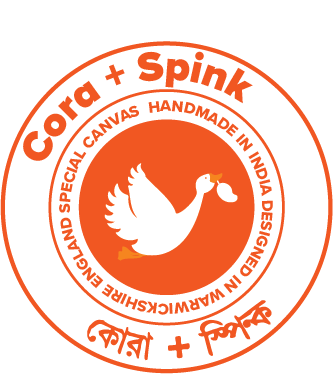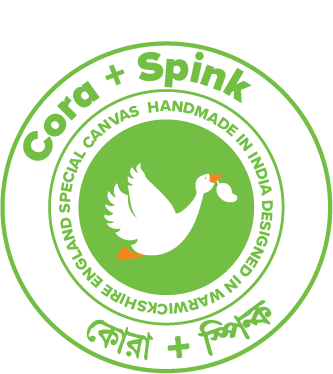We take pride in our small, independent business and how we can be part of every process to bring a backpack from drawing board to your back. But this doesn’t mean we don’t take the consequences of modern slavery seriously. Here’s an outline of how C+S protects it’s supply chain from modern slavery.
Cora + Spink Modern Slavery Policy.
At Cora + Spink, we are committed to conducting our business ethically and with transparency. We take the issue of modern slavery very seriously and are committed to preventing it from occurring within our business and supply chain.
One way in which we ensure that our workers are treated with dignity and respect is by running our own dedicated workshop in India. By having our own facility, we are able to directly control and oversee the working conditions for our employees. We have implemented strict policies and procedures to ensure that all of our workers are treated fairly and with respect, and we are able to monitor these conditions on a regular basis to ensure that they are being upheld.
In addition to running our own workshop, we have also implemented robust systems to monitor and assess the working conditions in our supply chain. This includes regular audits and checks to ensure that our standards are being met by our suppliers. By having a direct relationship with our suppliers, we are able to work with them to ensure that they also uphold the same high standards that we do.
In the UK, we also uphold the same high standards for our workers. We pay fair wages and offer good working conditions, and we are committed to the welfare and well-being of all of our employees. The choice of our supply chain is directly influenced by our commitment to working with people and ensuring they are happy, as a result we tend to focus on working with independently owned business, where we have a direct relationship with the business – on a daily basis.
We believe that it is our responsibility to ensure that modern slavery does not occur in any part of our business or supply chain. If you have any concerns or questions about the way we conduct our business, please do not hesitate to contact us. We are always happy to discuss these important issues and work with you to ensure that we are doing everything we can to prevent modern slavery from occurring.
What is Modern Slavery?
Modern slavery is a term that refers to the exploitation of individuals for their labour or services through the use of force, fraud, or coercion. It includes practices such as human trafficking, forced labour, and debt bondage, and can occur in across variety of industries, including the fashion industry.
In the fashion industry, modern slavery can take many forms. It can include the exploitation of workers in the production of clothing, accessories, and other fashion items, through practices such as low wages, long working hours, and poor working conditions. It can also include the use of child labor, or the exploitation of workers through debt bondage or other forms of coercion.
It is important for fashion companies to be aware of the risks of modern slavery in their supply chains and to take steps to prevent it from occurring. This can include conducting regular audits of working conditions, establishing clear policies and procedures for addressing any instances of exploitation, and working with suppliers to ensure that they are complying with relevant laws and standards.
Debt Bondage is a real concern.
Debt bondage, also known as “bonded labour” or “indentured servitude,” is a form of modern slavery in which an individual is forced to work in order to pay off a debt. It is a particular concern in the textile and fashion industry, where workers may be recruited with the promise of a high-paying job, only to find that they are required to work long hours for low pay and are not allowed to leave until their debt is paid off.
Debt bondage is particularly prevalent in countries such as China, where there is a high demand for cheap labor in the textile and fashion industry. In these cases, workers may be recruited from rural areas and promised a good wage, only to find that they are required to work long hours for little pay and are not allowed to leave until their debt is paid off. This debt is often inflated through the addition of high fees and other costs, making it difficult for workers to ever fully pay off their debt and escape bondage.
It is important for companies in the textile and fashion industry to be aware of the risks of debt bondage in their supply chains and to take steps to prevent it from occurring. This can include conducting regular audits of working conditions, establishing clear policies and procedures for addressing any instances of exploitation, and working with suppliers to ensure that they are complying with relevant laws and standards.
What is C+S doing differently?
At Cora + Spink, we prioritize the use of handmade techniques and the development of personal relationships with our production partners. From the beginning, we have focused on producing small batches of products with artisans who are skilled, willing, and committed to working with us.
In an industry where mass production is often the norm, we believe that building relationships with the individuals who make our products is crucial to ensuring their well-being and preventing the risk of modern slavery.
By working closely with our production partners and openly addressing any challenges or issues that may arise, we are able to prioritize their needs and well-being over profits and quantity. We are committed to continuing to operate in this manner and encourage other businesses to adopt this approach as well.

Exploring Bangladesh.
Photography Ayesha Bibi.


